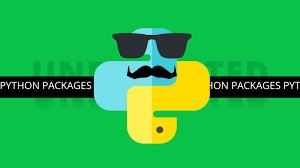10 Useful Python Packages That Will Make Your Life Easier

10 Useful Python Packages That Will Make Your Life Easier
Python is a versatile language that you can use on the backend, frontend, or full stack of a web application. In this article, we will introduce 10 of the most useful Python packages that will make your life easier.
1. Django: Django is a high-level Python web framework that enables rapid development of secure and scalable websites.
2. Flask: Flask is a lightweight Python web framework that provides all the essential features for building a web application.
3. Pyramid: Pyramid is a flexible Python web framework that comes with a wide range of features, making it suitable for building applications of any size and complexity.
4. SQLAlchemy: SQLAlchemy is a Python library that enables developers to interact with databases in an efficient and concise manner.
5. Jinja2: Jinja2 is a template engine for Python that enables you to create highly readable and maintainable code.
6. Requests: Requests is an HTTP library for Python that allows you to send HTTP requests easily and efficiently.
7. Beautiful Soup: Beautiful Soup is a Python library that helps you parse and navigate HTML documents effortlessly.
8 .Pygments: Pygments is a syntax highlighting library for python that makes code morereadable and visually appealing . It supports over 300 languages 9 Nose : Nose is unit testing framework for python That extends the builtin unittest module to make tests more expressive And easier to
i3 windows manager
The i3 windows manager is a great tool for managing your windows in a Python development environment. It allows you to easily move and resize your windows, and also provides some basic window management features such as titlebar buttons and keyboard shortcuts.
i3 is available on PyPI, so you can install it using pip:
pip install i3-py
Once you have installed i3, you can start using it by running the following command:
i3-py
i3 is a tiling windows manager for Linux that is lightweight and easy to use.
i3 is a great choice for those who are looking for a tiling windows manager that is lightweight and easy to use. It is perfect for those who want to have complete control over their window management without having to use a lot of complicated keyboard shortcuts. i3 is also highly customizable, so you can change the way it looks and feels to match your personal preferences.
i3 is highly customizable and can be configured to suit your needs.

If you want a highly customizable desktop environment, then i3 is the window manager for you. With its easy-to-use configuration file, you can tailor i3 to exactly how you want it. Don’t like the default keybindings? No problem, just change them in the config file. Want to add a new panel or modify an existing one? Again, simply edit the config file. need more text
i3 is available in most Linux distributions and can be installed using your package manager.
i3 is a tiling window manager, which means it automatically arranges your windows in a non-overlapping manner, without the need for manual intervention. This makes it very efficient to use, as you don’t have to waste time aligning and resizing windows.
i3 is highly configurable – you can bind keys to specific actions, change the color scheme and layout of the windows, and much more. There is also a large community of users who have created their own configurations and themes which you can download and use.
If you’re looking for a window manager that is fast, efficient, and highly configurable, i3 is a great choice.
i3 is a great choice for those looking for a simple and efficient windows manager.
i3 is a tiling window manager, which means it automatically arranges your windows in a pre-defined way, without the need for you to manually position them yourself. This can make your workflow much more efficient, as you don’t have to constantly adjust your windows to suit your needs.
i3 is also very lightweight and fast, which makes it ideal for use on older or lower-powered computers. And because it doesn’t rely on any fancy graphics or animations, it can run very smoothly even on older hardware.
Overall, i3 is a great choice for anyone who wants a simple and efficient way to manage their windows. It’s perfect for those who want to be productive and get things done quickly, without having to fiddle around with window placement all the time.
change password on windows
Assuming you already have Python installed on your Windows system, open the command prompt and type:
pip install passlib
This will install the passlib module, which we will use to generate our password.
Next, open up a text editor and create a new file called password.py. We will use this file to store our Python code.
In the password.py file, import the passlib module and create a new function called generate_password():
def generate_password(): “”” Generate a random password using the passlib module “”” # Use the random number generator to create a 16-character password return passlib. random.getrandstr(16)
After the function is defined, add the following code to call the function and print the generated password to the console:
if __name__ == “__main__”: print(generate_password())
Save the file and then open up the command prompt again. Type in:
python password.py
You should see a randomly generated password printed to the console.
Now that you know how to generate a random password using Python, let’s look at how you can change your password in Windows.
To change your password in Windows, open up the Control Panel and click on User Accounts. In the User Accounts window, click on Change your password.
Enter your old password and then enter your new password twice. Once
windows in Linux
Python is a versatile language that you can use on any operating system. One of the benefits of using Python is that there are many packages available that can make your life easier. In this article, we will look at 10 useful Python packages that will make your life easier.
1. pyenv: This package allows you to manage multiple Python versions on your system. It is helpful if you need to work with different versions of Python for different projects.
2. virtualenv: This package allows you to create virtual environments for your Python projects. This is helpful if you want to isolate your project from your system’s default Python installation.
3. Jupyter: This package allows you to create interactive notebooks for your Python code. This is helpful for data analysis and scientific computing.
4. NumPy: This package provides support for large, multi-dimensional arrays and matrices. This is helpful for numerical computing and scientific computing.
5. pandas: This package provides support for data analysis and manipulation. This is helpful for working with tabular data such as CSV files.
6. matplotlib: This package allows you to create static, animated, and interactive visualizations for your Python code. This is helpful for data visualization and presentation.
7. seaborn: This package provides additional support for data visualization, including statistical graphics and color schemes. This is helpful for exploratory data analysis and presentation.
